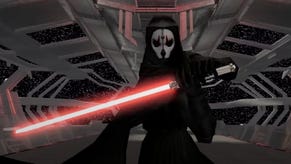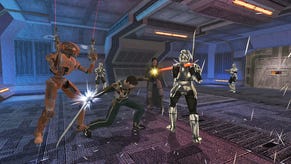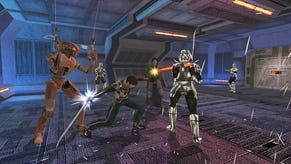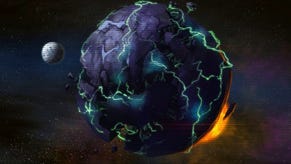Star Wars Knights of the Old Republic II: The Sith Lords
The Old Knights of the Old Republic made new. Ish.
Order yours now from Simply Games.

Writer Annie Dillard suggested - and I paraphrase - that a writer should never leave the price-tags. This means you shouldn't let the reader know the effort which it took you to create a piece of writing. If it took you four years of research to cobble together a paragraph, you shouldn't leave anything that implies it was anything other than a few sentences glued together with word-plastics. Specifically, anything you created which purely exists to justify the research should be snipped by the holy hands of editing.
With the greatest of respect to Anne Dillard, she didn't spend over twelve hours a day for four days running to save the Goddamn universe.
See that face? That's the face of a man who's faced the foul touch of the Sith. It's a game that took me so deep that I've even started to look like a Jedi. Or, failing that, a tramp. It's so difficult to tell with these modern haircuts.
No, I haven't got time to shave. The Sith are going to destroy Dantoonie!
It's addictive. It kills your social life dead. And it's still the greatest Western style RPG on the consoles. In terms of creating an Xbox RPG in which you define yourselves by your decisions, minor and major, it's peerless.
Those provisos given I'm going to be a little harsh to KOTOR2, so I'm almost certainly sure that the review will read a little lower than the 8/10 that it'll find itself rewarded with. This is the way of the world. Any game can be the recipient of an infinite amount of writing about it - something that has been at least a year of people's efforts must mean there's enough to talk about for at least 20,000 words. The fifteen hundred or so I have here, before you get terribly distracted and wander off to investigate what incredible new perversion the porn-scientists have invented, have to choose their targets carefully. And why repeat what everyone's said before? KOTOR was great, and much that made it great reappears here.
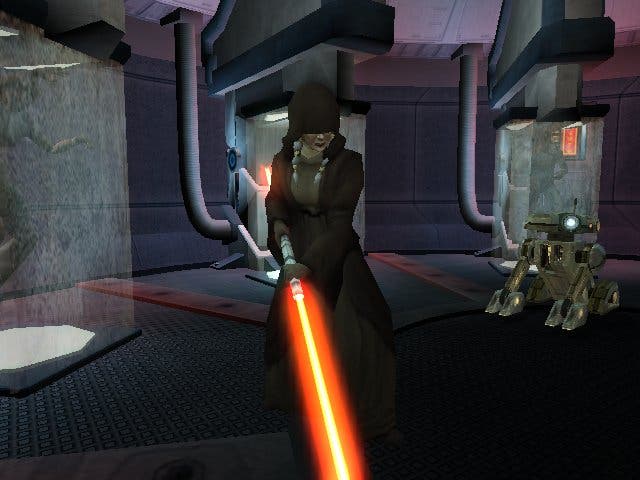
So we'll hit what's relevant and new, given the understanding that everything I wrote about the initial KOTOR stays true here. So remember: it captures the heroic note of the original game expertly, and continues to be the most romantic statement of Star Wars love currently available in the videogame lexicon. It creatures a universe, and whether you care about the Sith or not, it'll enchant you. Trust me: I'm a gamer who despises everything Lucas's little merchandising machine has begat, and still love KOTOR and child. Yes, it's perverted the imagination of a generation... but that Light Sabre sound-effect is still pretty nifty, y'know.
The basic mechanic changes in KOTOR2 are small but fundamental. For example, the simple addition of being able to use a single command to swap between two sets of weapons stops almost an infinite amount of time fiddling around with menu systems. Simply set up one group of weapons - usually one set for close-up and one set for ranged blasting - and you're away. It's hugely welcome.
Similar small tweaks abound. For example, rather than being stuck with several dozen random Qu'raaas'rr;hh'sgfh random punctuation devices, you can head to a workbench and recycle them. Anything you have no use for can be broken down into its constituent chemicals, and then recombined into artefacts you're interested in utilising, like the Haahhhahhhhahh Made-Up Word Modulator.
This would lead to a degree of considerable depth in KOTOR's simulation, except it continues one of the original's more odd aspects: that is, it's ludicrously easy. Determined to make an entry-ist Western-style RPG, it has created a game where utilising the full variety of approaches available makes your march through the game to be pretty much irresistible. If you're playing on the light side, for example, once you've got hold of the ridiculously effective Force-Stasis power, you'll find yourself entirely capable of pacifying whole groups of enemies then putting them to the sword one by one.
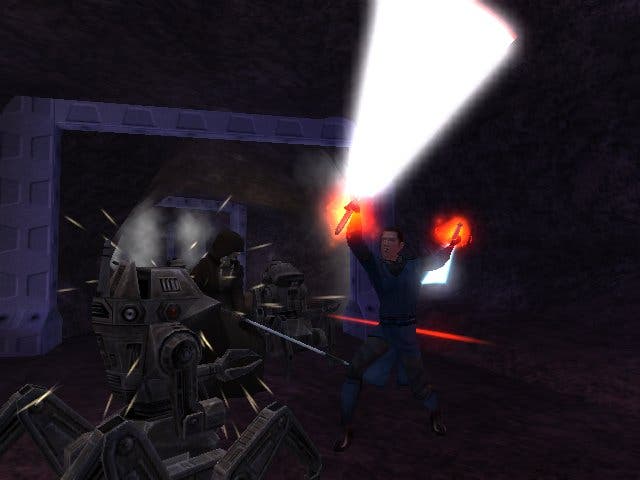
It's worth noting that this was equally true with the original. On normal level, someone vaguely familiar with the manipulation of RPG statistics is going to find the vast majority of KOTOR2's challenges a walkover. Even on hard, a determined RPG-head is going to easily work their way through the confrontations the game offers.
But it's not all about simple can-you-hit-them-harder-than-they-hit-you. Rather than original creators Bioware, the game's developed by Obsdian, which was formed from the ruins of Black Isle. This leads to a strongly noticeable influence from games like genre-defining classic Planescape Torment. KOTOR2 features noticeably more text than the original, and also reacts more strongly depending upon your character's development. For example, having a high-level of repair skill will open conversational gambits based upon your technological know-how, with similar options appearing depending on your other choices or inclinations. While, yes, there's much of the classic Western-RPG triumvirate of "Yes, I'd like to help you very much you lovely man/Okay, Sure, how much will you pay me?/YOU MUST DIE!!!", it's considerably mixed up by other, more subtle, options.
This density of response isn't solely a positive aspect, however. Putting aside those who are turned off by a mass of dialogue - it's important to remember there's a reason other than remedial marketing which consigned Planescape Torment to the bargain bins - it keeps the failing of the first game of having simply too many characters. While the general standard of writing is as good as any game, with so many individuals able to join your party it's all too easy to lose track of the character arcs. It's especially true since you're only able to have the console-standard three-people-to-go-on-adventures-with-you-at-any-time, meaning for vast periods of your adventure the majority of your team are sitting on the Ebon Hawke and playing Pazaak. That said, it improves the game over the last by having far less of the gathered parties being hopelessly ineffective. Rather than the original, when you found yourself gravitating towards perpetual three-Jedi groups, here you'll gather a more cosmopolitan party before setting off to save the world.
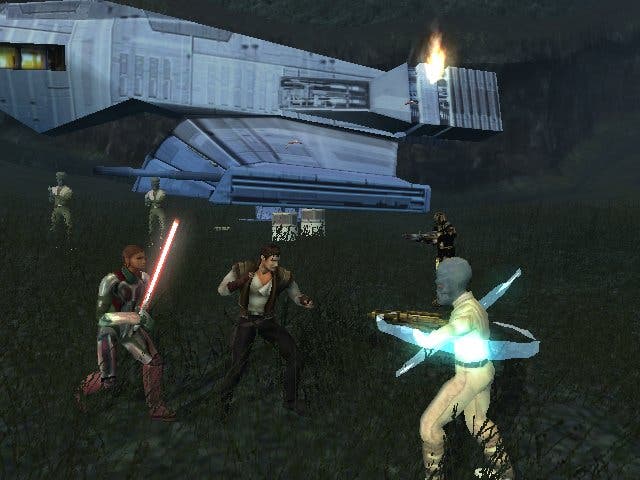
The smarter breed of reader will by now have grasped one of the major problems with KOTOR2. The fact that there was a full paragraph devoted to "You can switch weapons on one command" should imply this isn't exactly Brave New World territory. This is very much a slightly improved version of KOTOR taken out for another spin, with another plot slid into the engine. Partially it underlines how much it's what you choose to do with an engine that matters rather than the engine itself - after all, Half-life 2 and Vampire: Bloodlines both rest on the same technical base. This feels a very different beast to the original KOTOR purely because the plot Obsidian has chosen to fire through the filter. It's far more grey; more Empire Strikes Back than Star Wars to choose an apposite example - including the somewhat open conclusion. Equally, the planetary set-pieces are generally better developed and paced, referencing everything including pop-culture (Seven Samurai-esque defend-villages-on-Dantoonie, for example) with many nods towards the original.
But its ingenuity in turning the weaknesses in the game into strengths can go only so far (Remember Planescape turning the quick-load immortality into actual immortality? There's something similarly metacritical, if more subtle, here). While there's a thrill in returning to locations you're familiar with ten years on in game terms, it can't overwhelm the realisation that these are just the original levels stripped bare and re-fabricated according to Obsidians whims.
It's understandable why the team did it. They had a year and a bit to get this massive game constructed. At 40 hours of solid play, it's a good third longer than the original. But understandable doesn't mean excusable.
And even less excusable is the degree of bugs that have reached the Xbox version. The original was twitchy, but this is much more so. At the least, expect amusing gallivanting by your digital actors in the cut-scenes as people walk into each other and/or walls on the way to their requisite positions. At the worst, expect everything from broken quests downwards. In the middle, expect looping conversation trees and even worse pathfinding than the find-Sith-by-way-of-Mongolia of the original. Put simply, it's one of the buggiest console games I've ever played.
Of course that matters, but by keeping to the same closely measured design throughout, it matters less than the even buggier Vampire: Bloodlines. It drives at its familiar riffs, throws in a few unexpected and joyous chords, hits a few bum notes and then leaves the stage.
It'll be a hard audience that doesn't call for some manner of encore.
Order yours now from Simply Games.

